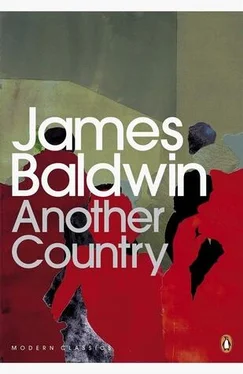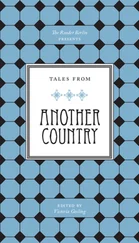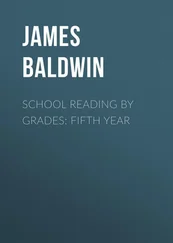He wiped his forehead with his wet handkerchief and the three of them sat in silence for a moment. Then, “I’m going to call Cass,” Vivaldo said, and rose and walked toward the phone booth in the back.
“I understand,” said Ida, carefully, “that you were a very good friend of my brother’s.”
“Yes,” he said, “I was. Or at least I tried to be.”
“Did you find it so very hard — to be his friend?”
“No. No, I hadn’t meant to suggest that.” He tried to smile. “He was very wrapped up in his music, he was very much — himself. I was younger then, I may not always have — understood.” He felt sweat in his armpits, on his forehead, between his legs.
“Oh.” She looked at him from very far away. “You may have wanted more from him than he could give. Many people did, men and women.” She allowed this to hang between them for an instant. Then, “He was terribly attractive, wasn’t he? I always think that that was the reason he died, that he was too attractive and didn’t know how — how to keep people away.” She sipped her drink. “People don’t have any mercy. They tear you limb from limb, in the name of love. Then, when you’re dead, when they’ve killed you by what they made you go through, they say you didn’t have any character. They weep big, bitter tears — not for you . For themselves, because they’ve lost their toy.”
“That’s a terribly grim view,” he said, “of love.”
“I know what I’m talking about. That’s what most people mean, when they say love.” She picked up a cigarette and waited for him to light it. “Thank you. You weren’t here, you never saw Rufus’s last girl friend — a terrible little whore of a nymphomaniac, from Georgia. She wouldn’t let him go, he tried all kinds of ways of getting away from her. He even thought of running away to Mexico. She got him so he couldn’t work — I swear, there’s nothing like a Southern white person, especially a Southern woman, when she gets her hooks into a Negro man.” She blew a great cloud of smoke above his head. “And now she’s still living, the filthy white slut, and Rufus is dead.”
He said, hoping that she would really hear him but knowing she would not, perhaps could not, “I hope you don’t think I loved your brother in that terrible way that you describe. I think we really were very good friends, and — and it was an awful shock for me to hear that he was dead. I was in Paris when I heard.”
“Oh! I’m not accusing you . You and I are going to be friends. Don’t you think so?”
“I certainly hope so.”
“Well, that settles it, as far as I’m concerned.” Then, smiling, with her eyes very big, “What did you do in Paris all that time?”
“Oh”—he smiled—“I tried to grow up.”
“Couldn’t you have done that here? Or didn’t you want to?”
“I don’t know. It was more fun in Paris.”
“I’ll bet.” She crushed out her cigarette. “ Have you grown up?”
“I don’t know,” he said, “any longer, if people do .”
She grinned. “You’ve got a point there, Buster.”
Vivaldo came back to the table. She looked up at him. “Well? How are the kids?”
“They’re all right. Cass sounded a little distraught, but she sends her love to both of you and hopes to see you soon. Are we going to hang around here, or what are we going to do?’
“Well, let’s have supper,” Ida said.
Vivaldo and Eric looked at each other for the briefest of seconds. “You’ll have to count me out,” said Eric, quickly. “I’m bushed, I’ve had it, I’m going to go home and hit the sack.”
“It’s so early, ” Ida said.
“Well, I just got off a boat and I’m still vibrating.” He stood up. “I’ll take a rain check on it.”
“Well,” she looked at Vivaldo, humorously, “I’m sorry the lord and master isn’t in a better mood.” She moved herself out of the booth. “I’ve got to go to the little girl’s room. Wait for me upstairs.”
“I’m sorry,” said Vivaldo, as they climbed the stairs into the street, “I’d really looked forward to sitting around and bullshitting with you tonight and all, but I guess you really better leave us alone. You understand, don’t you?”
“Of course I understand,” said Eric. “I’ll give you a call next week sometime.” They stood on the sidewalk, watching the aimless mob.
“It must feel very strange for you,” said Vivaldo, “to be back here. But I hope you won’t think we’re not friends any more, because we are. I care a lot about you, Eric. I just want you to know that, so you won’t think I’m putting you down gently, sort of, tonight. It’s just one of those things.” He stared outward, looking very weary. “Sometimes that girl gets me so I don’t know if I’m coming or going.”
“I know a little bit about it,” Eric said. “No sweat.” He held out his hand; Vivaldo held it for a moment. “I’ll give you a call in a couple of days, all right? Say good-bye to Ida for me.”
“All right, Eric. Be well.”
Eric smiled. “Stay well.”
He turned and started walking toward Sixth Avenue, but he did not really know where he was going. He felt Vivaldo’s eyes on his back; then Vivaldo was swallowed up in the press of people behind him.
On the corner of Sixth Avenue, he watched and waited, the lights banged on and off. A truck came by; he looked up into the face of the truck driver, and felt an awful desire to join that man and ride in that truck wherever the truck was going.
But he crossed the street and started walking toward his apartment. It was the safest place to be, it was the only place to be. Strange people — they seemed strange to him now, but, one day, again, he might be one of them — passed him with that ineffable, sidelong, desperate look; but he kept his eyes an the pavement. Not yet, not you. Not yet. Not yet .
On the Wednesday afternoon that Ida went off to see Ellis, Cass called Vivaldo at the midtown bookshop where he worked and asked if she could buy him a drink when his day was over. The sound of her voice, swift, subdued, and unhappy, had the effect of jolting him out of his own bewilderment. He asked her to pick him up at the shop at six.
She arrived at the exact time, wearing a green summer dress which made her look very young, carrying an absurdly large straw handbag. Her hair was pulled back and fell over her shoulders; and, for a moment, watching her push through the doors, both blurred and defined by the heavy sunlight, she looked like the Cass of his adolescence, of years ago. She had then been the most beautiful, the most golden girl on earth. And Richard had been the greatest, most beautiful man.
She seemed terribly wound up — seemed to blaze, nearly, with some private, barely contained passion. She smiled at him, looking both young and weary; and for a moment he was faintly aware of her personal heat, her odor.
“How are you, Vivaldo? It’s been rather a while since we’ve seen each other.”
“I guess it has. And it’s been my fault. How are things with you?”
She shrugged humorously, raising her hands like a child. “Oh. Up and down.” Then, after a moment, “Rather down right now.” She looked around the store. People were peering into bookshelves rather the way children peered in at the glass-enclosed fish in the aquarium. “Are you free? Can we leave now?”
“Yes. I was just waiting for you.” He said good night to his employer and they walked into the scalding streets. They were in the Fifties, on the East Side. “Where shall we have this drink?”
“I don’t care. Someplace with air conditioning. And without a TV set. I couldn’t care less about baseball.”
Читать дальше












